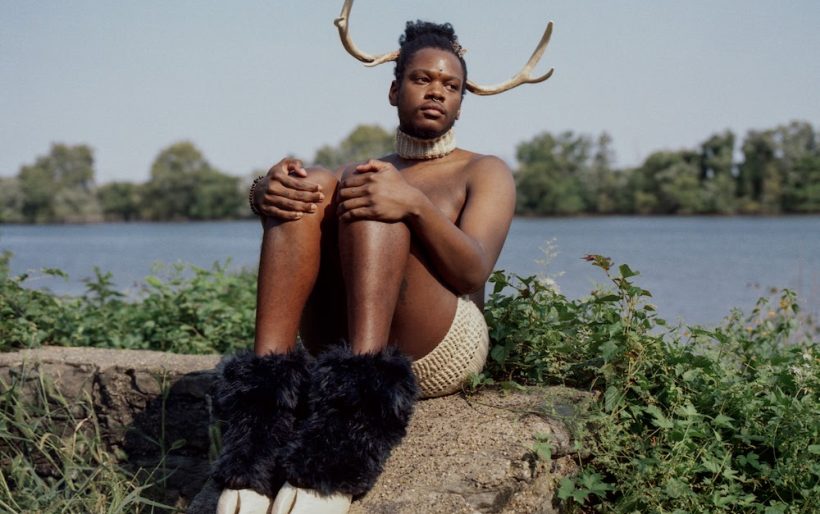Understanding Shamir: Philly’s multifaceted pop auteur on being yourself and following your muse

Shamir | photo by Marcus Maddox | courtesy of the artist
Shamir Bailey is not an artist to shy away. If his career is proof of anything, it’s that embracing the novel and new is a recipe for artistic growth that trepidation could never provide. From his accession to “accidental popstar” to his years running a record label and self-releasing records at a frantic clip, Shamir is laser-focused on exploring his specific sound, wherever that may take him. That remains as true as ever on Shamir’s newest record, Heterosexuality, a record of grungey pop and expansive indie-rock.
And yet, despite this, there was one song Shamir almost never wrote. “Abomination”, which arrives right as Heterosexuality hits its stride, is a acidic, smirking takedown, of capalistic ideals. It’s confident and striding and, as Shamir tells it, terrifying. You see, Shamir hadn’t rapped since “On The Regular”, the breakout hit that first landed him a Pitchfork Best New Music and eventually led to a record deal with XL Recordings. Of course, it also led to the dissolution of that deal and Shamir almost quitting music all together. There were plenty of times Shamir considered dipping his toe back into those waters, but this was the first time he truly felt comfortable enough to return to a style that had such an outsized effect on his career. It’s an idea that runs the record as a whole; an attempt to remove any ego or fear that might stifle creativity.
I recently got a chance to talk with Shamir about, among other things, Heterosexuality’s Luciferian cover art, being anti-anti, and finding inspiration in a new creative partnership.
The Key: Tell me a little bit about the album cover and why that felt like appropriate imagery for the record?
Shamir Bailey: The whole look for this era was inspired by the Baphomet and I just think I relate to the image that Baphomet represents. I feel like it is a very misunderstood creature and symbol that is often demonized because of how grotesque it might look on the outside. I feel like that in a lot of ways, as a visible, queer, and Black person navigating this word. So that was a part of my decision in embracing the Baphomet.
TK: You’ve been taking on a lot of creative endeavors outside of music as of late, namely your streetwear brand Bipolar Butterfly and your book on painting But I’m A Painter. How do these avenues of expression free you up when you come back to music?
SB: I guess I am a workaholic. I have always been into things outside of music. After I was done promoting my self-titled record, which was fast and abrupt because I couldn’t tour it, I made a conscious decision to use the space between album cycles to do other things. It was the best decision and is something I will probably continue to do.
TK: What else specifically would you like to explore creatively?
SB: I’d like to write a full-length book for sure. The first book was just a chapbook and that was really hard to constrain myself to a medium that small. I’d really like to write a full-length book eventually. Obviously more acting but you can’t really plan that. I kind of just periodically do auditions here and there and hope it works around my music schedule. Those are the two main things, but you never know what will pop up. The whole streetwear thing was completely by chance and just sounded like a great opportunity and a way to raise some money for charity so why not? Another thing I want to continue to do between releases is covers. I did a Billie Eilish cover, “Just Like Heaven” with Christian Lee Hutson, a Laura Viers cover for the 30th anniversary of Kill Rock Stars, and a Esther Rose cover.

TK: Considering all you’ve been through as an artist, what are your views on audience expectation? Do you think at all about how people will react to the music you are making?
SB: No, I don’t. As you know, every record is like a totally different genre. I mean, I do think about it in the sense that I do think I am very good at taking criticism. There have been times when I’ve felt myself misunderstood by the critics but even when I do I don’t get too angry. I take that information in a very neutral way and that has helped me grow, honestly. I don’t think you often hear artists say that and that’s artists being very egotistical. I think my ego is pretty removed from my music. I only continue to do my music after literally stepping away from it because, in a weird way, I make the most money off of my art and have a label to fund and other creative avenues I can nourish through being more ambitious through my solo career. My ego isn’t attached to it, so I often like to hear the good and the bad and whatever feedback for my art. I think that’s what makes me able to grow and sharpen my craft even though every record is very different.
TK: Why do you think people have an obsession with genre and placing artists in these preconceived boxes?
SB: As a nonbinary, super intersectional, super bisexual, even bicostal artist, as someone who is always in the middle, as someone who finds it impossible to sit in the confines of any structure, I do understand them and I understand their place. I think if anything, my gripe with boxes and genre and gender is that for some reason, I don’t have the privilege of fitting into any of them. I think it is cool when an artist is able to find a lane and grow within it and kill and sound good and is able to expand that genre. I just can’t. That is not the type of artist I am. I feel like a lot of people think I am very anti-genre but, while I know that has proven to be true in a lot of ways, I don’t like it. But that is another whole conversation. I think people think I want to be this trojan horse for a future kind of amorphous sound but no, that’s not what I want. I just want artists to be true to themselves and if that means every record is a different genre then so be it.
TK: How do you balance being wholly yourself and also embracing a role as spokesperson for marginalized communities?
SB: Just by being myself. Not only am I a Black queer artist that rejects genre, but I am super DIY artist that refuses to be boxed in in a way a lot of Black and/or queer aritsts are put in for the sake of success. I think it is important for me, on behalf of my community, to always do what I want to do and what feels correct to me. I just think as long as I am doing that, I am helping the community. Aside from the sweeping stuff I am actively doing, but anyone can do that. It almost feels to me that it almost cancels out if you are a Black, queer person who feels a level of strife in the industry and you’re not really actively working to change it. A lot of times it is just powerful to lead by example. That is more important to me than the physical work I do with the community.
TK: Much of your previous work has been self-released, is that also the case this time around?
SB: I did for the first half of the cycle but then after I released “Cisgender” I got signed to AntiFragile Music which is run by Tom Sarig, who is amazing. I was planning to continue to do it solo when he sent me the most thoughtful email after hearing “Cisgender” and I could tell this person really got it. He believed in the record so much he signed me mid-cycle. I knew I was only ever going to sign with a label if the vibes were completely right with someone who gets it and that is the situation. We are all on the same page which is so refreshing because I’ve never really had that experience at this level with anyone in the industry, let alone labels. I think a lot of people thought I was anti-label but I was just waiting until the vibes were completely correct and this feels right.
TK: How did you come to work with Heterosexuality producer Hollow Comet?
SB: He hit me up out of nowhere about two weeks after Shamir came out. We met maybe once beforehand by chance through a mutual friend. I was familiar with his band, Strange Ranger. I think I commented on one of their new singles that started to expand their sound and a week or so later he responded and expressed an interest in working together. I listened to the EP he sent me and I was just like, oh my god. I remember I almost got overwhelmed, almost crying listening to it because it was just this sound I’d been dreaming of for so long and her he was right under my nose just casually DMing me. This was by far the easiest time I’ve had working with someone. It was such a fast and easy and smooth process.
TK: I’ve seen you talk about this a little bit in the past, but can you talk about the difference, in your mind, between accessibility and trying specifically to write a hit?
SB: The difference is that accessibility requires a little more earnestness and honesty than a hit song. Humans are empathetic beings and I think no matter the genre, no matter the type of music it is, we can feel when something feels universal. The perfect example is any of The Cure’s music. Even the songs they engineer as pop songs aren’t the ones that are as well known. “Just Like Heaven” should not have been as huge a hit as it was. It has a weird chord progression and doesn’t even really have a chorus but it is just the soul of earnestness that everyone can access on a empathetic level. Whereas a hit is just completely engineered, like G.M.O. Scientists in a lab trying to figure out the lowest common denominator for what everyone wants and needs. I don’t think that’s necessarily a bad thing. I’m a songwriter and I’ve been part of songwriting rooms. It’s fun, it’s fine but it is different.